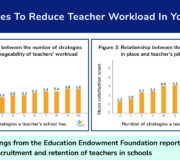Improving Pupil Progress: 6 Tried And Tested Strategies
Pupil progress is what we, as educators, strive for day in and day out. However, it’s not always clear what the most effective strategy for this is.
In 2025, only 62% of KS2 pupils reached the expected standard in reading, writing and maths. At KS4, 67.1% of students reached a Grade 4 or above in maths and English, a drop from 67.4% in 2024. Every decision educators and school leaders make and action taken is so that, over time, pupils will make continued progress and ultimately reach these expected standards or higher.
This guide to pupil progress offers teachers and school leaders clarity on what pupil progress means, how to use pupil progress tracking, and how to apply data and proven strategies to enhance teaching methods and boost learner engagement.
What is pupil progress?
Pupil progress is an intention – a goal – the end point of all our efforts. It’s about students developing their knowledge, skills and abilities over time. At every stage in a pupil’s school career, early years, primary school and secondary school, the aim is continued progress.
Therefore, monitoring of secondary education and primary education is essential to ensure continued educational development for all pupils.
The purpose of all we do as educators is pupil progress of the whole pupil: academically, socially and emotionally.
Adaptive Teaching CPD Guide For Schools
Discover the key strategies for implementing adaptive teaching across your school to help meet students’ needs and improve pupil progress.
Download Free Now!Tracking pupil progress
If pupils are to make progress, then tracking pupil progress is essential. Educators need detailed knowledge of how well learners are doing.
Pupil progress tracking enables educators to clearly understand pupils’ learning journey within and across subjects and qualifications. So, to track pupil progress, educators must gather attainment data.
The ongoing nature of tracking pupil progress means this data acts as both summative and formative information. Schools often use the same data to monitor achievement at a point in time and to make informed decisions as to what is needed next.
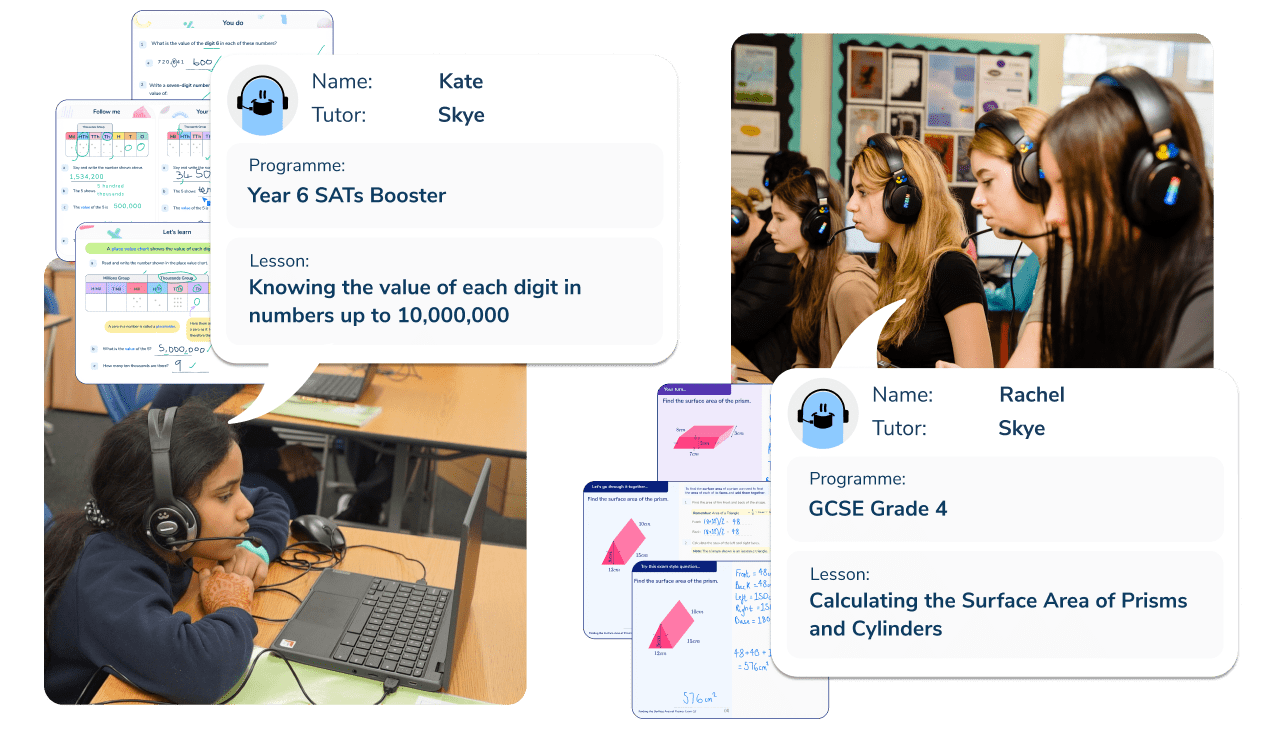
Meet Skye, the voice-based AI tutor making maths success possible for every student.
Built by teachers and maths experts, Skye uses the same pedagogy, curriculum and lesson structure as our traditional tutoring.
But, with more flexibility and a lower cost, schools can scale online maths tutoring to support every student who needs it.
Watch Skye in actionUsing the data
Schools can benefit from gathering and analysing data beyond identifying pupils’ areas of strength and weakness.
Data enables targeted interventions and support to be planned and delivered.
It provides schools with actionable insights to communicate to students, parents, and carers.
Reporting a detailed account of a pupil’s learning journey to them and their families can help motivate further progress.
Assessments for pupil progress
For valid pupil progress data, school leaders must ensure that assessment strategies are rigorous and consistent across a pupil’s time in school.
Schools should design, source or adapt assessment materials which:
Link to the exact content taught in each year group;
Are age-appropriate in language;
Give pupils the best chance to truly show what they know;
- Educators track consistently across the school.
Such assessments should be accessible to all pupils, regardless of need.
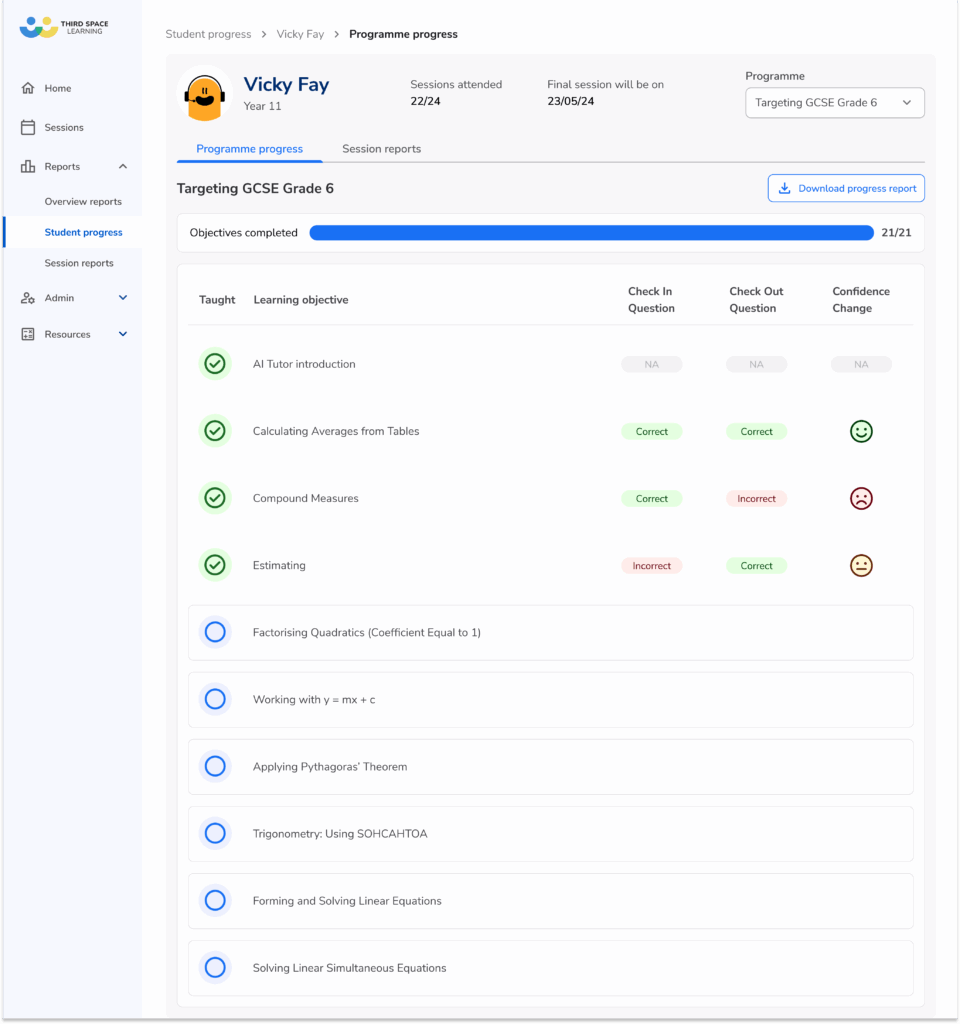
Pupil progress meetings
Regular pupil progress meetings are a vital component of effective progress tracking in both primary and secondary settings. These structured conversations between class teachers, subject leads, and senior leadership provide dedicated time to analyse:
- Individual and cohort-level data
- Identify trends
- Plan targeted interventions.
The most effective pupil progress meetings go beyond simply reviewing data. They become professional development opportunities where teachers can share best practices, discuss teaching approaches, and develop action plans to support struggling learners and those ready for greater challenges.
To maximise their impact, these meetings should be:
- Well-structured with clear agendas
- Occur at regular intervals throughout the academic year
- Have specific, measurable actions that are followed up in subsequent meetings.
6 tried and tested strategies to improve pupil progress
Accelerating pupil progress involves using simple yet effective strategies that cater to the unique needs of each student. By focusing on practical insights and creating a nurturing learning atmosphere, teachers can help students achieve better results.
Here are 6 tried and tested, effective strategies schools can implement to improve pupil progress.
1. High-quality teaching
High-quality teaching is essential to ensuring pupil progress. According to a study from The Sutton Trust, during one year with a very effective maths teacher, pupils gain 40% more in their learning than they would with a poorly performing maths teacher.
Two qualities of highly effective educators include being:
Adaptive
Responsive
Adaptive teaching ensures that learning is accessible for all pupils, making accommodations where necessary and approaching planning, preparation and teaching in a way that prioritises those who might find the content the most difficult to understand.
Responsive teachers seek up-to-date information about how well pupils are managing the work. They change their approaches accordingly and react to the precise needs of the pupils.
Adaptive and responsive teachers ensure that real-time tracking and monitoring of student progress leads them to adapt their teaching strategies and provide targeted support. They use teaching strategies which help students to develop a growth mindset and to appreciate their own achievements.
Teacher CPD opportunities should centre around developing quality first teaching which leads to good pupil progress.
Third Space Learning’s Maths Hub provides a range of videos leaders can use for maths CPD during staff meetings, training days or to assign to teachers to watch.
2. Formative assessment
Formative assessment allows educators to check progress daily and respond to their findings. It informs educators of pupils’ understanding and then helps teachers form teaching and learning opportunities to address knowledge gaps. Such assessment data helps educators identify student needs and create effective teaching strategies.
Assessment for learning (AfL) approaches that include the pupils in self- and peer-assessment, as well as goal-setting and action planning, ensure that students have a clear idea of what they need to do to get better and allow them to monitor their own progress, too.
Such AfL approaches can be as simple as observing, questioning and giving feedback to pupils. But, they can extend to the use of mini-whiteboards, exit tickets and use of success criteria for peer- and self-assessment.
Whilst recording the findings of formative assessment isn’t intrinsic to formative assessment, doing so can be useful when monitoring pupil progress over a longer period. Records help educators to see where students received targeted support, and to identify those who might also benefit from it.
Additionally, such evidence provides information about progress to pupils and parents during parents’ evenings and during pupil progress meetings for school leaders.
Although formative assessment does not provide the accurate grade calculations that a summative assessment (such as the use of a past paper) might give, it is essential in ensuring that pupil progress happens daily. Small steps of progress add up to greater progress over the course of a year, key stage, or school phase.
Third Space Learning uses formative assessment throughout every one to one maths tutoring session to check pupils’ understanding. AI tutor Skye can then adapt its teaching strategies and level of support and scaffolding to maximise pupil understanding.
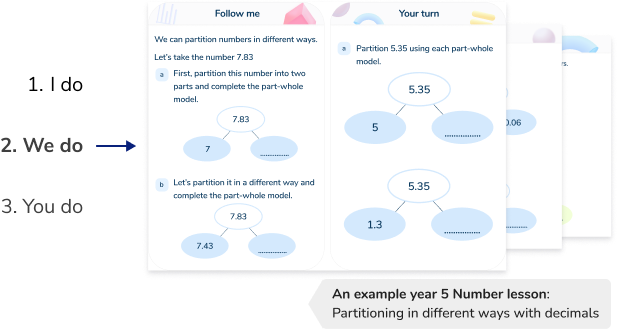
3. Parental engagement and support
Parental engagement is a key factor in improving student outcomes and can be done for zero cost. When parents are supportive, understanding and knowledgeable about what’s going on in their child’s education, pupils are more likely to make progress.
But parents can feel left out of what’s happening at school. It is for educators to clearly communicate, support and provide resources to help them engage with their child’s learning.
To improve parental engagement, schools should generate positive dialogue about learning and development by providing specific guidance to parents about how they can support their child.
Liaise with families to review how well pupils needs are being met, particularly when the pupil has specific needs. Identify successes and areas for improvement; this could include homework requirements, class changes and in-lesson support.
Schools and trusts should consider the specific needs of the families of pupils and offer more sustained and intensive support where needed.
4. Reducing teacher workload
When teachers are less stressed, they feel more energised in the classroom and have more mental resources at their disposal to direct towards high-quality teaching.
Technology can play a significant role in reducing teacher workload regarding assessment data and pupil progress tracking.
However, even tech-based tracking solutions can become onerous. School leaders should be careful to pick easy-to-use software and resist the urge to require teachers to input excessive data.
5. Create a culture of progress
Culture eats strategy for breakfast, said Peter Drucker. Culture can be defined as a commonly-held set of beliefs which, when acted upon, impacts the climate of an organisation.
Pupil progress isn’t an add-on, it needs to be a baked-in part of the culture: creating a culture of progress and improvement is essential for driving pupil progress and improving student outcomes.
A true culture of progress will ensure that teachers believe that assessing pupils and tracking their progress is an integral part of the job, and not just another task being added to their already long list of things to do.
Leaders must lead by example in this area, showing that they are dedicated to improving themselves, their staff, and their pupils. Staff and pupils must see that there is a clear link between what they are asked to do and the goals of pupil progress.
School leaders should take care to evaluate all practices and strategies to ensure they are developmental and supportive, rather than punitive or just because they’ve always been done.
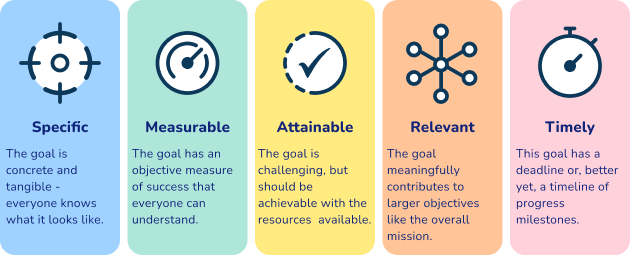
6. Implement targeted interventions
It’s not the gathering of data that is most important; it’s what you do with your findings.
Implementing targeted schoool interventions and support based on this information is essential for improving pupil progress and student outcomes.
Interventions don’t always have to be one to one or a small group sessions outside of the classroom with another staff member. An intervention is any way you might intervene to ensure that pupils make progress. For example, during whole class teaching, you may adapt and scaffold learning if you can see pupils are not understanding the intending learning.
Once the data identifies areas of strength and weakness, implement the targeted support required. This could take place in the classroom and be implemented by the pupil’s usual teacher. Intervention doesn’t have to be time-consuming, it can simply be provided by that adaptive and responsive teaching that we mentioned earlier.
For those learners who do require extra intervention outside of whole class teaching, many schools turn to Third Space Learning for targeted and personalised one to one maths interventions. With primary programmes designed for KS2 and SATs, and secondary programmes designed for targeting GCSE grades 3-7, Skye can personalise learning to help accelerate pupil progress in maths.
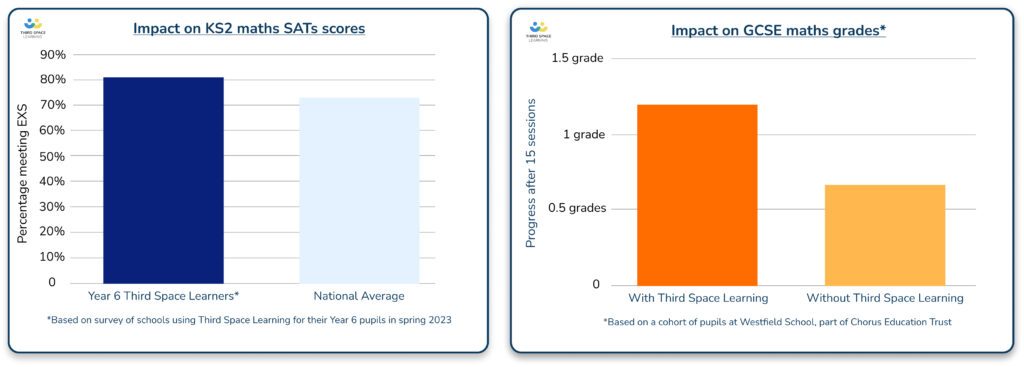
Improving pupil progress with Third Space Learning
Over 4,000 schools have used Third Space Learning to improve pupil progress in maths since 2013. With affordable tutoring that provides unlimited sessions and pupil spaces, schools can enrol every pupil who needs extra maths support. School leaders trust our highly trained AI maths tutor to close pupils’ knowledge gaps.
Every pupil enrolled in the one to one tutoring takes a diagnostic assessment skill check in question before each session. Their answers determine the level of support AI tutro Skye provides. If pupils answer correctly, they move on to independent practice and more challenging questions. However, if they answer incorrectly, Skye walks them through the lesson, step by step, to ensure they build a deeper understanding of the mathematical concept.
Throughout the lesson, Skye scaffolds support according to the misconceptions pupils hold.
At the end of the lesson, pupils answer a skill check out question to assess their learning and progress during the lesson. An independent study by Educate Ventures Research in 2025 found that while pupils only andwerd 34% of skill check in questions correctly, they answered 92% of skill checkout questions correctly.

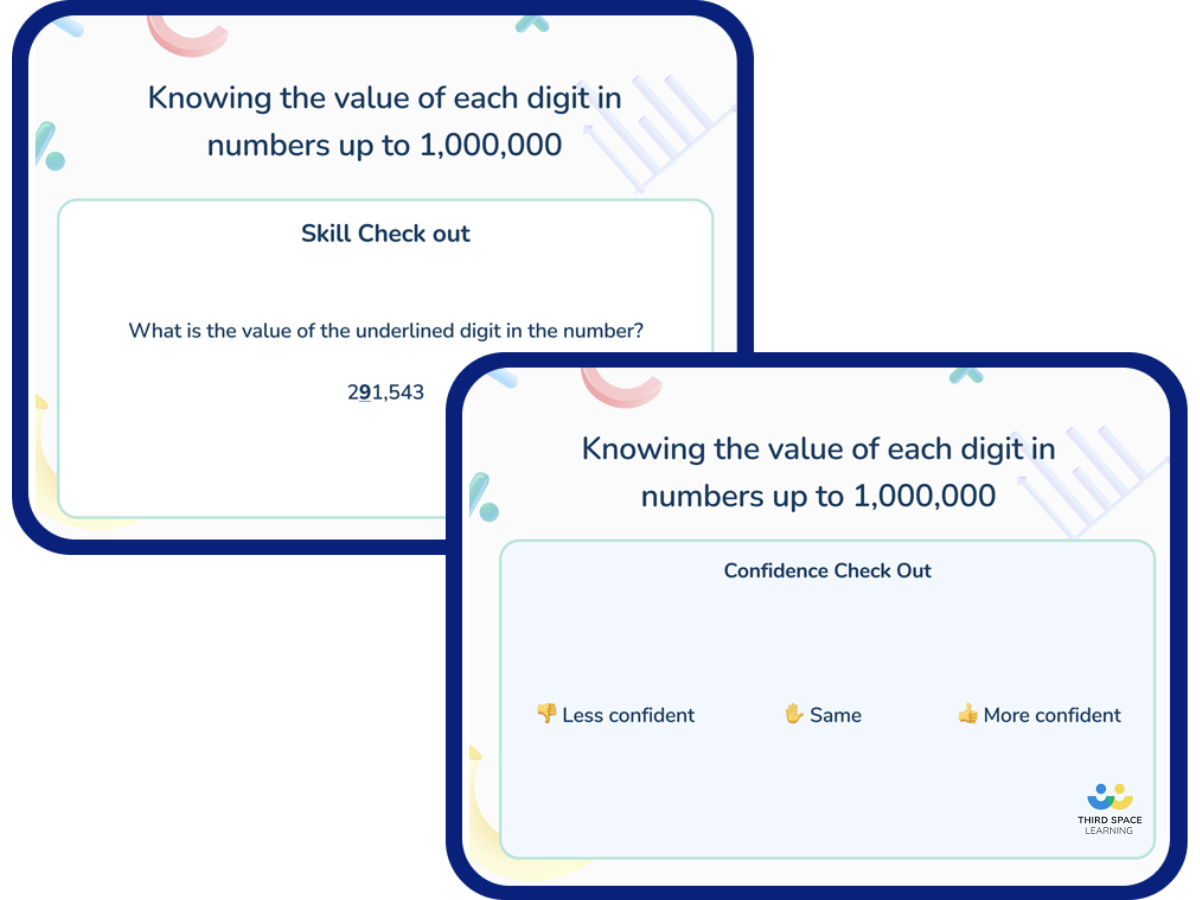
Key takeaways
To achieve the goal of pupil progress, schools must not obsess over excessive data entry and formidable pupil progress meetings. Instead, a positive culture of wanting the best for pupils should be the bedrock of all the hard work that goes into helping students to improve.
Upon this bedrock must sit a genuine concern for teacher workload, with school leaders doing all they can to allow teachers to provide that all-important high-quality teaching, including those crucial formative assessment strategies and targeted interventions.
Give pupils every chance to make progress, ensuring that they themselves, as well as their parents, are involved in the process of improving themselves each and every day.






